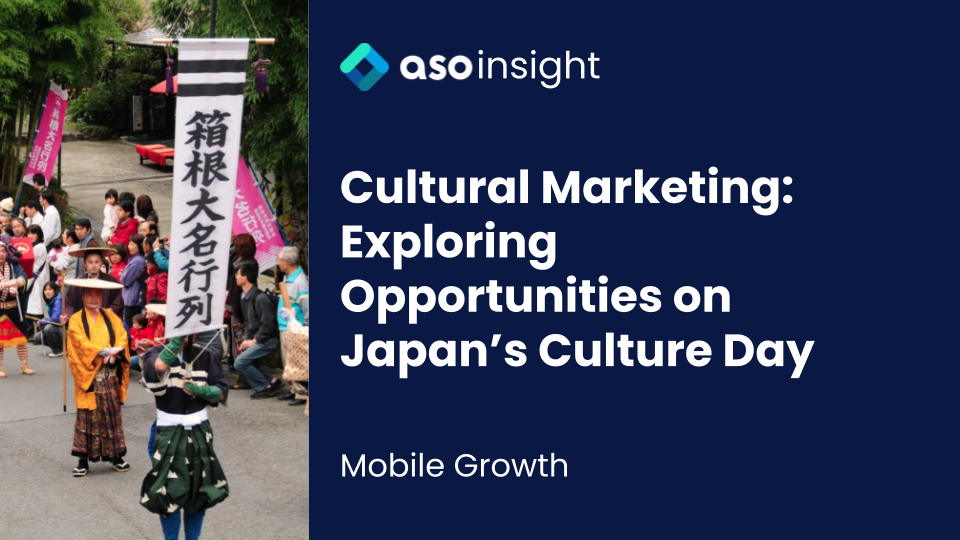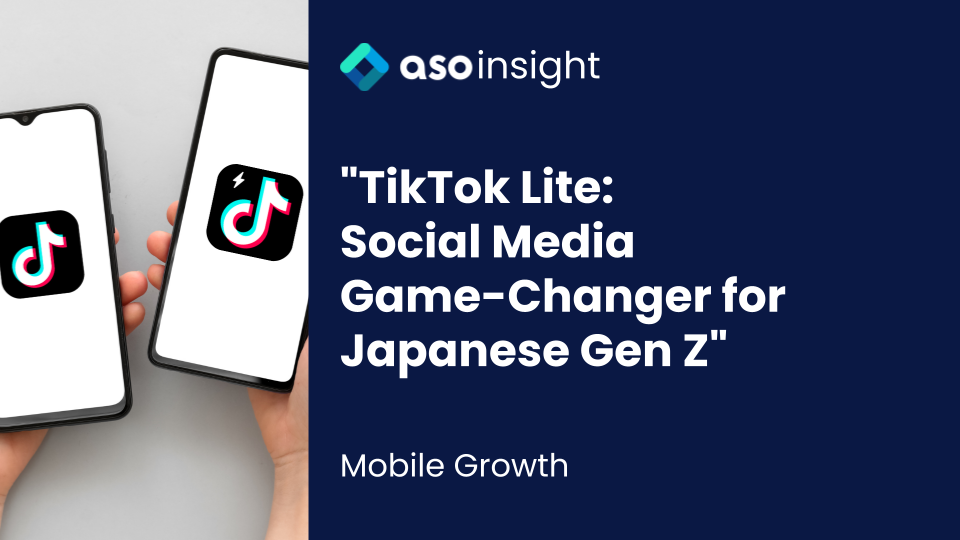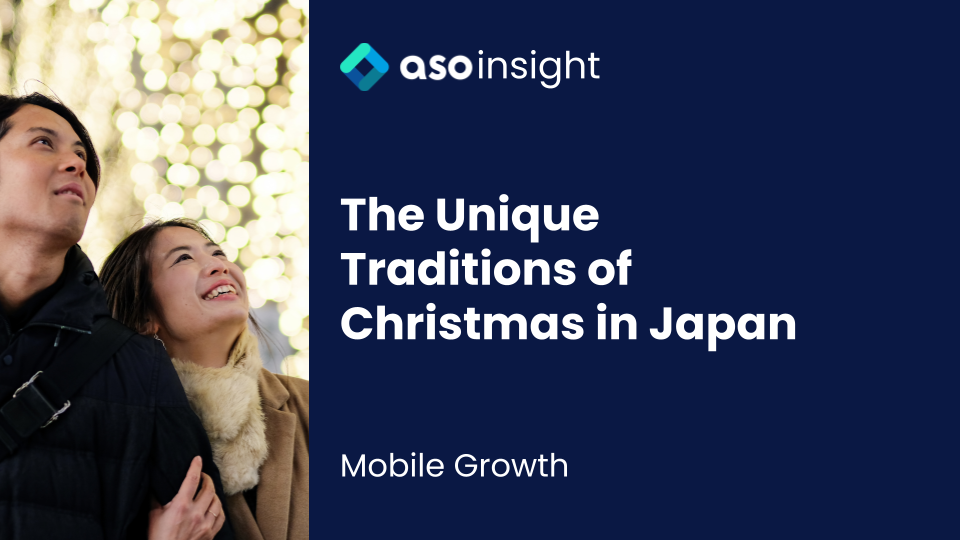Introduction
Japan’s Culture Day, known as “Bunka no hi,” is a national holiday that holds a special place in the hearts of its people. Celebrated annually on November 3rd, it’s a day when the nation comes together to honor its rich cultural heritage, arts, and academic achievements. In this article, we’ll delve into the significance of Culture Day, explore the ways it’s celebrated, and consider the marketing opportunities it presents.
Contents
About Culture Day (Bunka no hi)
Culture Day in Japan is a special national celebration that honors traditional Japanese culture and the values of freedom and peace established in the Japanese constitution. It’s been a public holiday since 1948, but it was officially recognized in 1946 after World War II. During the first week of November, which is called Education and Culture Week (教育と文化の週), various events related to education and culture take place across Japan to increase public interest and understanding. Schools and universities all over the country participate.
November 3rd is a significant date because it marks the birth of Emperor Meiji, who ruled Japan from 1867 to 1912. In 1927, it became a national holiday known as Meiji Setsu (明治節) to honor the late Emperor, but it later transformed into Culture Day. The celebrations for Culture Day don’t necessarily happen only on November 3rd; they can extend over several days.
How do Japanese People Celebrate Culture Day?
Japanese people celebrate Culture Day by participating in a variety of events and activities. Families often visit museums, attend art exhibitions, or take part in local festivals. Schools and educational institutions use the occasion to showcase students’ cultural projects and talents, promoting a deep appreciation for art and culture from a young age.
Highlights of Culture Day
Culture Day is marked by a host of festivities and events that reflect the vibrancy of Japan’s culture and history. The key highlights include:
1. Free Museum Access: On Culture Day, most museums across Japan open their doors to the public for free, providing an excellent opportunity for people to explore art, history, and science.
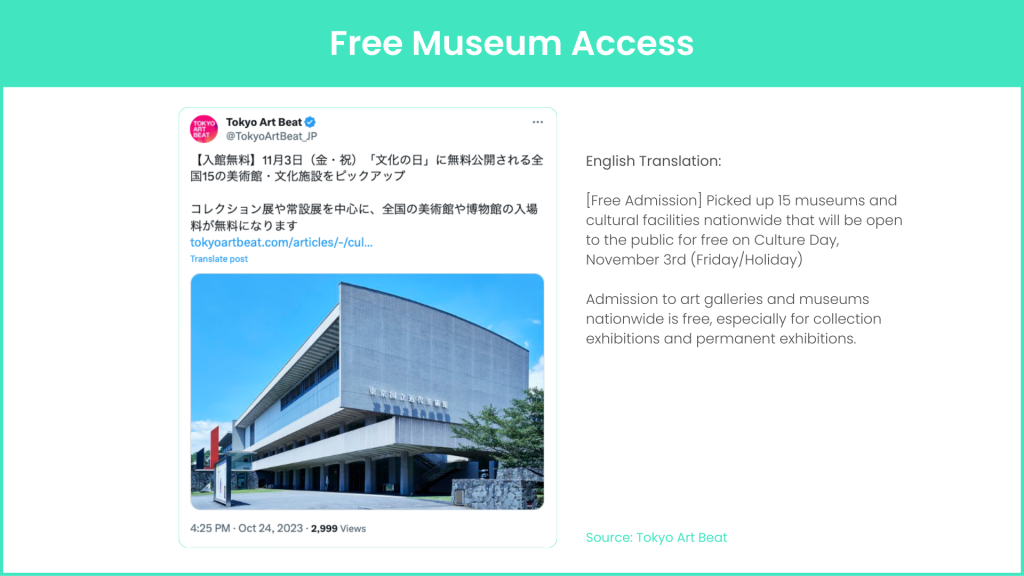
An app disseminating exhibition information, news, and interviews from around the country announcing a list of 15 museums and cultural facilities nationwide that will be open to the public for free on Culture Day.
2. Art Exhibitions: Art and historical museums often organize special exhibitions, showcasing specific periods in Japanese history or renowned artists’ works.
3. Local Traditions: Different regions have unique customs. For instance, Hakone in Kanagawa hosts the “Daimyo Gyoretsu,” a procession that reenacts historical practices and helps people understand Japan’s rich past.
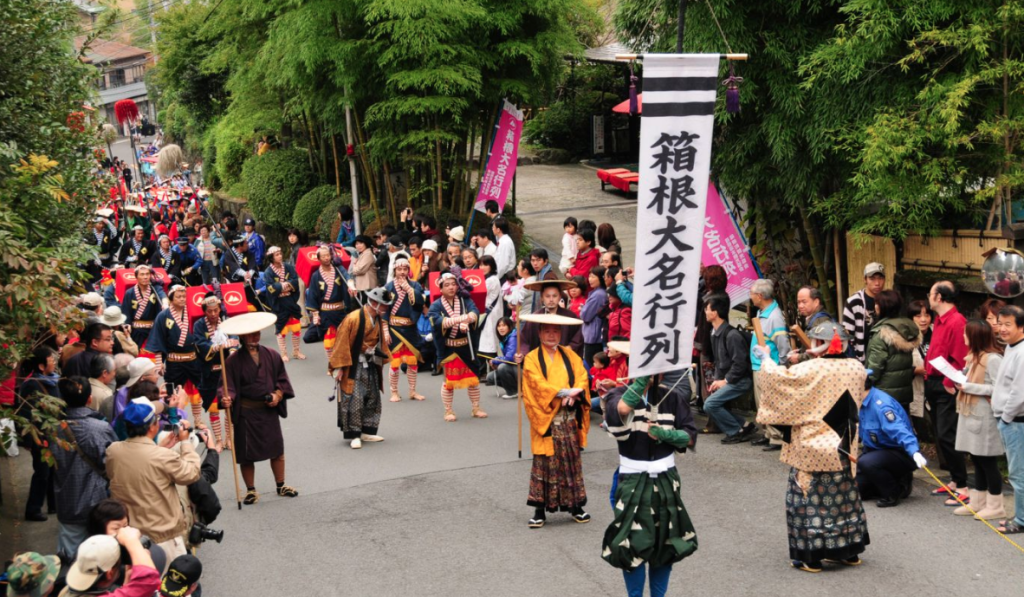
Hakone Daimyo Gyoretsu Procession | Photo source: Hakone Japan
4. Order of Culture Award Ceremony: One of the highlights is the prestigious Order of Culture Award Ceremony, where distinguished figures from various fields, including art, literature, sports, science, and technology, are honored in a formal ceremony at the Imperial Palace.
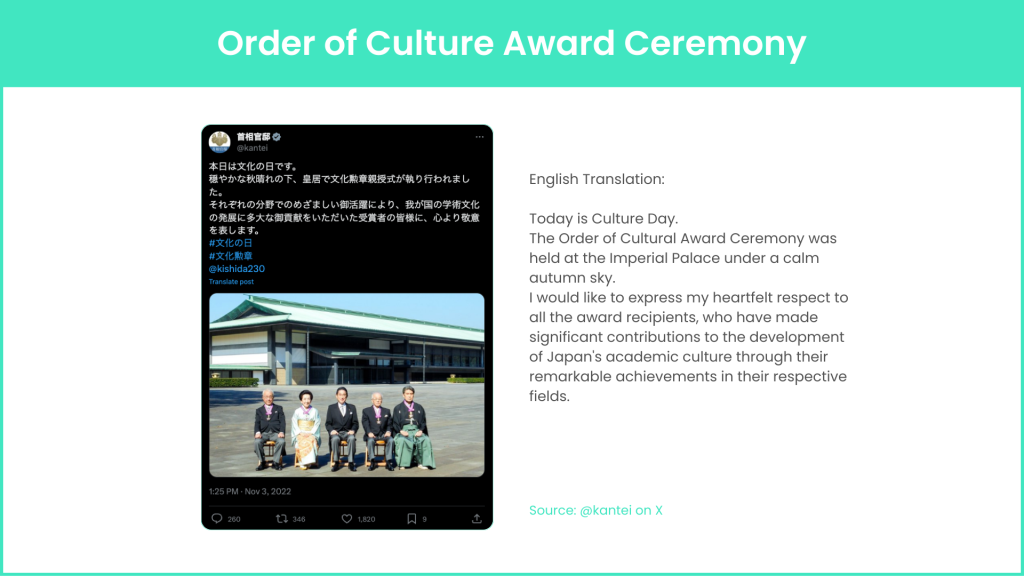
Marketing Opportunities
Culture Day offers numerous marketing opportunities, especially for businesses and organizations with ties to culture and the arts. Museums, art galleries, and cultural institutions can leverage the day to attract a larger audience and raise awareness about their offerings. Retailers can create special promotions or cultural-themed products to cater to the increased foot traffic on this day. Additionally, local governments and tourism associations can promote unique regional events to attract both domestic and international tourists.
Culture Day in Japan also presents marketing opportunities for app developers and digital businesses, particularly those related to culture, education, and entertainment. Here are some ways app developers can leverage this special day for marketing:
1. Cultural Learning Apps: Develop and promote apps that facilitate cultural learning. These could include language learning apps, history and heritage apps, or apps that provide insights into traditional Japanese art forms. On Culture Day, offer special discounts or free trials to attract new users.
2. Virtual Museum Tours: Collaborate with museums to create virtual tours within your app. On Culture Day, offer special guided tours or exclusive content related to Japanese culture, art, and history. This can draw a significant number of users interested in cultural exploration.
3. Art and Music Apps: Apps related to art, music, and creativity can capitalize on Culture Day by offering special features or content related to Japanese culture and traditions. For example, you could release new music lessons or art tutorials inspired by Japanese culture.
4. Educational Apps: For students and lifelong learners, develop educational apps with content related to Japan’s history, literature, or science. You can create special Culture Day courses or offer discounted access to existing ones.
5. E-commerce Apps: If your app is related to e-commerce, you can run special Culture Day promotions. Offer discounts on culturally relevant products or create Culture Day-themed collections. Make sure your marketing efforts highlight how your products or services connect to Japanese culture.
6. Event Apps: If your app is designed for event organization or promotion, help users discover and participate in local Culture Day events. Provide event listings, maps, and schedules for parades, exhibitions, and performances.
7. Content Apps: For apps that focus on content, consider curating special Culture Day collections. This can include a selection of books, articles, videos, or podcasts that explore Japanese culture, history, or contemporary trends.
8. Social Media Apps: Create Culture Day-themed filters, stickers, or augmented reality experiences within your app. Users can share their festive moments on social media using your app’s features.
9. Collaboration with Local Businesses: Partner with local businesses in Japan that celebrate Culture Day. Offer joint promotions, discounts, or special incentives for users who visit these businesses through your app.
10. Influencer Collaborations: Collaborate with Japanese influencers or experts in culture, history, or art. They can create exclusive content or host live sessions within your app, attracting their followers and increasing your app’s visibility.
11. User-Generated Content Contests: Encourage users to create and share their own cultural content on your app, such as art, music, or stories inspired by Japanese culture. Organize contests with prizes to encourage participation.
12. User Engagement: Engage with your app’s user community on Culture Day through social media or in-app messages. Ask for their thoughts on Japanese culture, share relevant content, or host quizzes and challenges.
Incorporating Japanese culture and the values of Culture Day into your marketing strategies can resonate with a wide audience. By offering unique and culturally relevant experiences or promotions on this special day, you can attract new users and enhance engagement with your app. Remember that cultural sensitivity and respect are crucial when promoting your app in a foreign context.
Conclusion
Culture Day in Japan is a time-honored celebration that beautifully bridges the past with the present, emphasizing the importance of freedom, peace, and cultural development. It’s a day of reflection, learning, and recognition of remarkable individuals who have made outstanding contributions to various fields. Culture Day not only serves as a reminder of Japan’s cultural heritage but also offers a platform for businesses and organizations to connect with a captivated audience. It’s a day where traditions and innovation harmoniously come together, showcasing the very essence of Japan’s cultural spirit.


